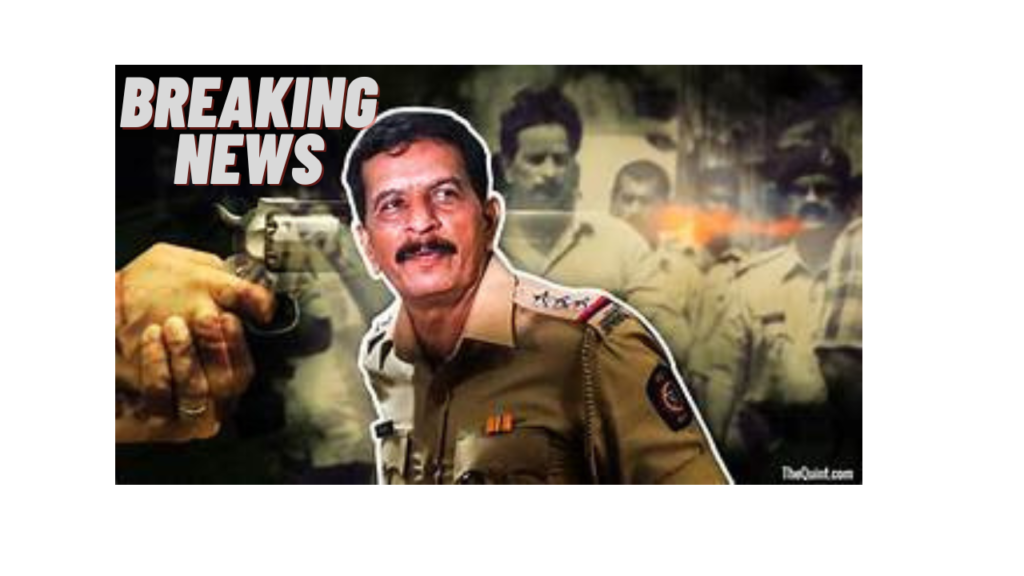The Bombay High Court on Tuesday convicted and sentenced former Mumbai police officer Pradeep Sharma to life imprisonment in the 2006 fake encounter killing of Ramnarayan Gupta alias Lakhan Bhaiya, an alleged member of the Chhota Rajan gang.
Pradeep Sharma, a “encounter specialist,” was ordered by the court to turn himself up within three weeks.
Allowing the state government’s appeal against Pradeep Sharma’s acquittal in July 2013, a bench of Justices Revati Mohite-Dere and Gauri V Godse in its 867-page ruling concluded that the trial court’s finding was “perverse and unsustainable”.
Convicting Pradeep Sharma of murder and other charges, it observed that the prosecution proved that Lakhan Bhaiya “was killed by the police, by trigger-happy cops, and the same was made to look like a genuine encounter”.
The bench also upheld the conviction of 12 other policemen and a civilian, Hitesh Solanki, in the case. However, it acquitted six others — Manoj Mohan Raj, Shailendra Pandey, Sunil Solanki, Mohamed Shaikh, Akhil Khan and Suresh Shetty.
The convicted policemen are Dilip Palande, Nitin Sartape, Ganesh Harpude, Anand Patade, Prakash Kadam, Devidas Sakpal, Pandurang Kokam, Ratnakar Kamble, Sandeep Sardar, Tanaji Desai, Pradeep Suryavanshi and Vinayak Shinde.
“Instead of upholding the rule of law, the police have misused their position and uniform, and have killed Ramnarayan in cold blood,” the bench stated.
It emphasized that “death in police custody must be curbed with a heavy hand and must be viewed seriously” and that there can be “no room for leniency as persons involved are the arm of state whose duty is to protect citizens and not to take law into their hands.” The bench also noted that even though Lakhan Bhaiya had ten cases against him, that did not give the accused the “license to kill” him.
The judgment further stated that the petitions of police inspector Arvind Sarvankar and civilian Janardan Bhange stood abated because they had both passed away while in court.
However, it noted that it was a “matter of shame” that the murderers of Anil Bheda, a prime witness who was killed “in a gruesome manner” on March 13, 2011—four days after the charges were filed—had not been apprehended and that the state CID had made “absolutely no progress” in the case for more than ten years.
It stated that a DNA sample was used to identify Bheda’s charred corpse when it was discovered.
The bench declared, “It is travesty of justice for his family,” and noted, “the police have hardly taken any pains” to apprehend those responsible. It stated that in order to “take the case to its logical end, lest people lose faith in the system,” the police should look into the murder.
The bench concluded that even while the trial court found the ballistic evidence to be “weak” and “overlooked” the fact that Pradeep Sharma was present at the crime scene and that other defendants were deputed to work under him, the trial court nevertheless acquitted Pradeep Sharma.
It stated that there was proof of witnesses, including Bheda, claiming that the accused’s attorneys and relatives had threatened them “to toe a particular line and to leave the city.”
Lakhan Bhaiya’s fictitious encounter happened on November 11, 2006, in the vicinity of Nana Nani Park in Versova, a few hours after he and a companion were picked up from Vashi.
In 2009, a special investigative team was directed by the High Court to file a formal complaint (FIR) upon discovering that Lakhan Bhaiya’s opponent had hired the police to assassinate him. The sessions court cleared Pradeep Sharma in July 2013 but handed life terms to 21 persons, including 13 police officers.
The state government argued in the High Court that the encounter was staged and that the accused had falsified the documents in their appeal, represented by special public prosecutor Rajiv Chavan and Lakhan Bhaiya’s brother, advocate Ram Prasad Gupta.
In August of last year, the Supreme Court granted release to Sharma, who had previously been detained by the National Investigation Agency in connection with the death of businessman Mansukh Hiran and the Antilia terror threat case. For more details click..
